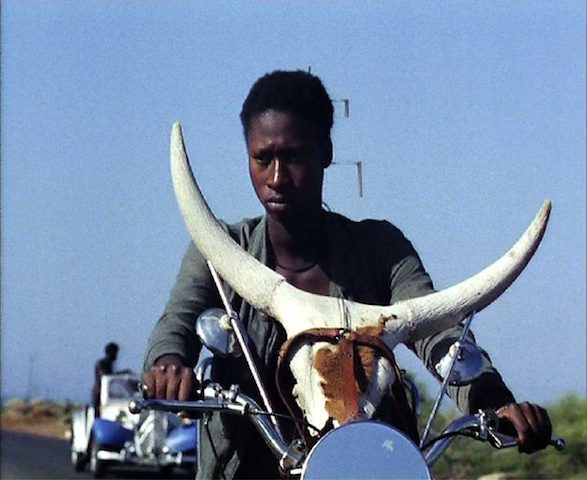Our author Storm Janse van Rensburg gives us a preview of the Queer Lisboa film festival...

Touki Bouki by Djibril Diop Mambéty
The issue of homosexuality in Africa has received significant international media attention in the recent past, focused on the increasingly draconian legislation “regulating” and punishing homosexual acts and the violence it engenders (with particular reference to recent events in Nigeria and Uganda). Whilst a grim reality, the complexity of legislative and social attitudes towards same-sex sexualities and identities and the nuances of how they are lived out on the continent are often ignored and left un-interrogated. This in effect locks discourse within the frame of homophobia and simultaneously reinforces stereotypes of the African continent as savage and uncivilized.
The Queer Focus on Africa at the 18th edition of the film festival Queer Lisboa (19–27 September 2014) is presented in the framework of the Queer Focus program. Conceived as a thematic curatorial platform within the larger festival, it provides for in-depth and critical investigations into pertinent current issues within queer cinema. A proposal by Africa.Cont, a Lisbon-based organization promoting contemporary visual culture from and in the African continent, led to this edition’s focus.
In a meeting with the dynamic Pedro Marum, a festival curator and co-curator (with Berlin-based Ricke Merighi) of the Queer Africa Focus program, it is clear that the organizers have given substantial consideration to the minefield of identity politics as well as the problematics of representing Africa as a monolithic entity. Marum stated in conversation that the curatorial approach in light of this task was one of “humility and learning.” In their catalog essay addressing these complexities, Marum and Merighi further state, “We decided to put aside our eagerness for coherence and completeness and go after lines and textures.”
In response to a question regarding the application of the term “queer” to an African context, where imposed LGBTI identities often fail to describe same-sex “contact relations”1 adequately, Marum explained that “queer” in the context of the Focus program in general functions as a denomination of “difference and marginality,” and with a political urgency that does not necessarily denote the representation of gay or lesbian sexuality in cinematic practices. It is thus simultaneously inclusive and seeking difference.
The program provides various forums for discursive engagements, not only as a context for the films presented, but also to provide a space for debate. The festival catalog includes substantial texts, most notably an essay by South African academic Martin Botha entitled “Queer Aesthetics in African Cinema” and a reflection on homophobia in Sub-Saharan Africa by cultural anthropologist Lia Viola. Two discussion forums are to be hosted during the festival tackling topics such as “Africa Beyond Heteronormativity” and “Queering African Cinema.”
The festival also presents contemporary art works form outside of the black box of the cinema, including a new performance piece by artist and curator Ato Malinda and two video installations, Kader Attia’s Collage (2011) and Amanda Kerdahi’s 100 Conversations (2014).
The lineup includes a total of 22 films with a spectrum that encompasses documentary, experimental, feature, animation, and short films. The focus opens with a screening of the recently remastered classic Touki Bouki (1973) by Djibril Diop Mambéty. A queer reading might not be obvious, but for the curators the work challenges stereotypes in its representation of the two lead characters in a non-conforming relationship that “bends and/or defies gender norms.” A bold curatorial choice, intended to foreground the problematics of the exotic gaze on Africa, focuses on Pier Paolo Pasolini’s failed attempt to produce an African Orestes. The recent documentaries Profezia, L’Africa di Pasolini (2013) and Appunti per un’Orestiade Africana (1970) will be screened.
Notable documentaries include Difficult Love (2010) by well-known photographer and “visual activist” Zanele Muholi, which tracks the lives and challenges of black lesbian experiences in South Africa. The extraordinary experimental short film Priest (2013) by Ntare Mwine is inspired by Ugandan Catholic priest Father Anthony Musaala’s open letter to the church. It employs a non-linear narrative structure and provides a visceral engagement with the issues at hand.
Considering the particular care taken by the organizers, curators, and collaborators, Queer Lisboa’s Focus on Africa promises an entertaining, engaging, and robust engagement with same-sex subjectivities and their manifestation in the moving image. In a European context, where Africa often gets the short end of the representational stick, there is much to be said for the sensitive and also daring willingness to create a challenging and self-reflexive context to consider the issues at hand.
1To paraphrase José Esteban Muñoz.
A full programme can be found here: http://queerlisboa.pt
Storm Janse van Rensburg is a South African born, independent curator and writer living and working in Berlin, Germany.
More Editorial